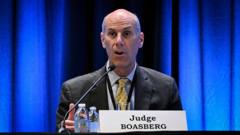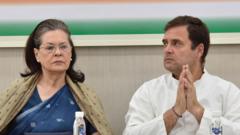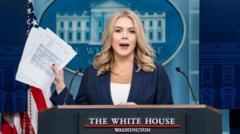Zubair's legal troubles have reignited debates about press freedom in India, with accusations of an escalating governmental crackdown on journalists who challenge narratives of hate speech.
Indian Fact-Checker Mohammed Zubair Faces Legal Challenges Over Hate Speech Critique

Indian Fact-Checker Mohammed Zubair Faces Legal Challenges Over Hate Speech Critique
Leading Indian journalist and fact-checker Mohammed Zubair is embroiled in controversy as he faces new court charges over a social media post highlighting hate speech.
In a developing legal saga, Mohammed Zubair, co-founder of AltNews and a prominent figure in Indian fact-checking journalism, finds himself once more entangled in a court case nearly two years after his prior release from prison. On Tuesday, the Allahabad High Court began hearing Zubair's petition in relation to fresh allegations put forth by Uttar Pradesh police, who claim Zubair is endangering "sovereignty, unity and integrity of India." The charges are serious, non-bailable, and could result in a lengthy prison sentence, with legal experts warning that his conviction might entail a minimum of seven years behind bars or even life imprisonment.
Zubair staunchly refutes the allegations against him, asserting that they are motivated by his commitment to holding those who propagate hate accountable. "I believe I’m being targeted for the work I do," he remarked. The current proceedings have met with disruption, as the judges involved recused themselves shortly after the trial commenced, resulting in an unresolved future for Zubair's case.
Zubair's troubles stem from a post shared on October 3rd, where he criticized virulent anti-Muslim remarks made by Yati Narsinghanand, a controversial Hindu priest known for inciting violence against Muslim communities. Narsinghanand's incendiary comments provoked protest actions, leading to further media attention on the issue. In a twist of events, Zubair now faces heightened charges after his initial, less severe accusations—including promoting communal enmity—were escalated to direct threats against national unity.
Zubair claims he is not the only individual highlighting Narsinghanand's dangerous rhetoric, noting that numerous journalists and media outlets have done the same. He describes this situation as a blatant example of targeting those who dare to critique the ruling regime's approaches to dissent. His colleague, Pratik Sinha, supports this view, asserting that the charges against Zubair represent a broader governmental effort to stifle independent journalism, likening the situation to a targeted witch-hunt.
Rights organizations have rallied around Zubair, condemning the use of broad legal provisions to silence dissent. Amnesty International India characterized the situation as indicative of systematic harassment of human rights activists and journalists. The Press Club of India has also decried these actions, pointing out that the legal framework being applied against Zubair resembles outdated colonial-era sedition laws, thus creating a chilling effect on freedom of expression.
As Zubair continues his legal battle, the implications of this case reflect a more complex landscape of press freedom in India, which has steadily deteriorated in global rankings. The situation exemplifies how critical journalism is increasingly being targeted under the pretext of national security, as voices demanding accountability encounter significant opposition from state apparatus.




















